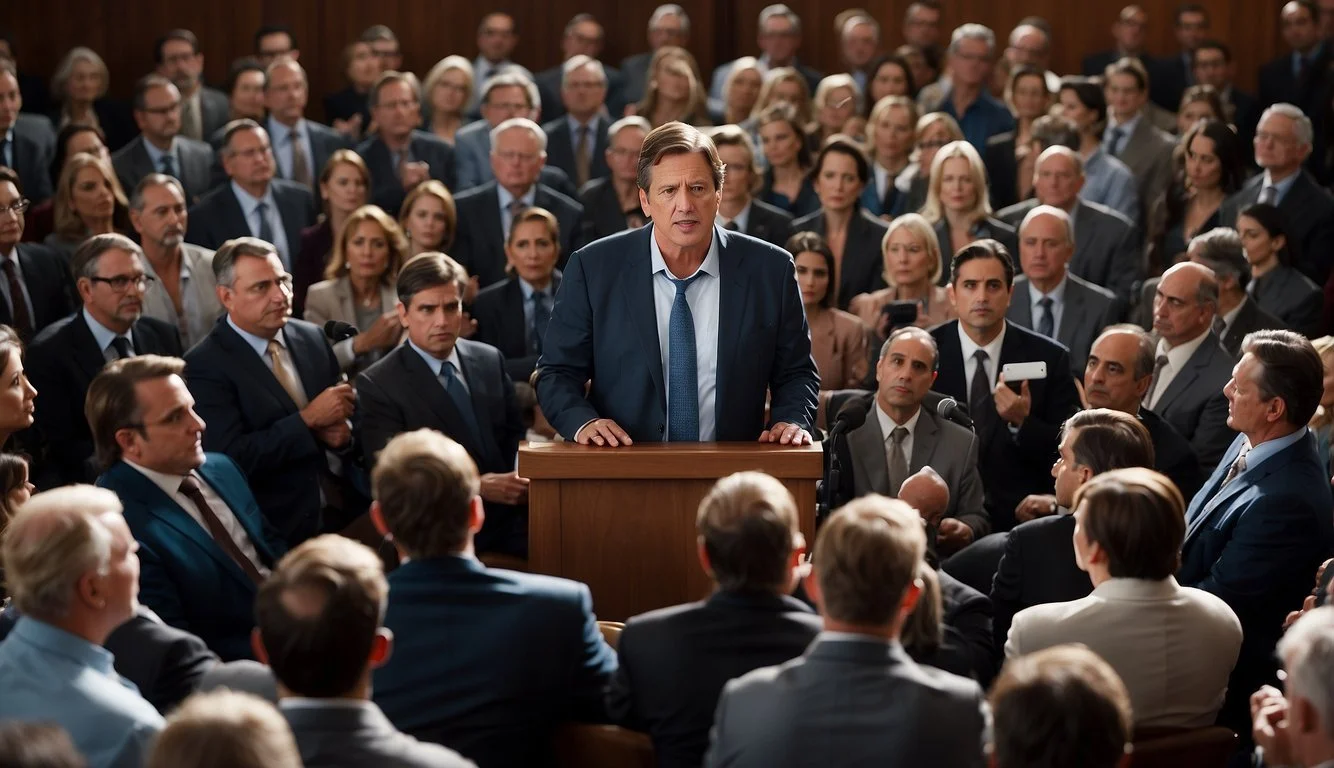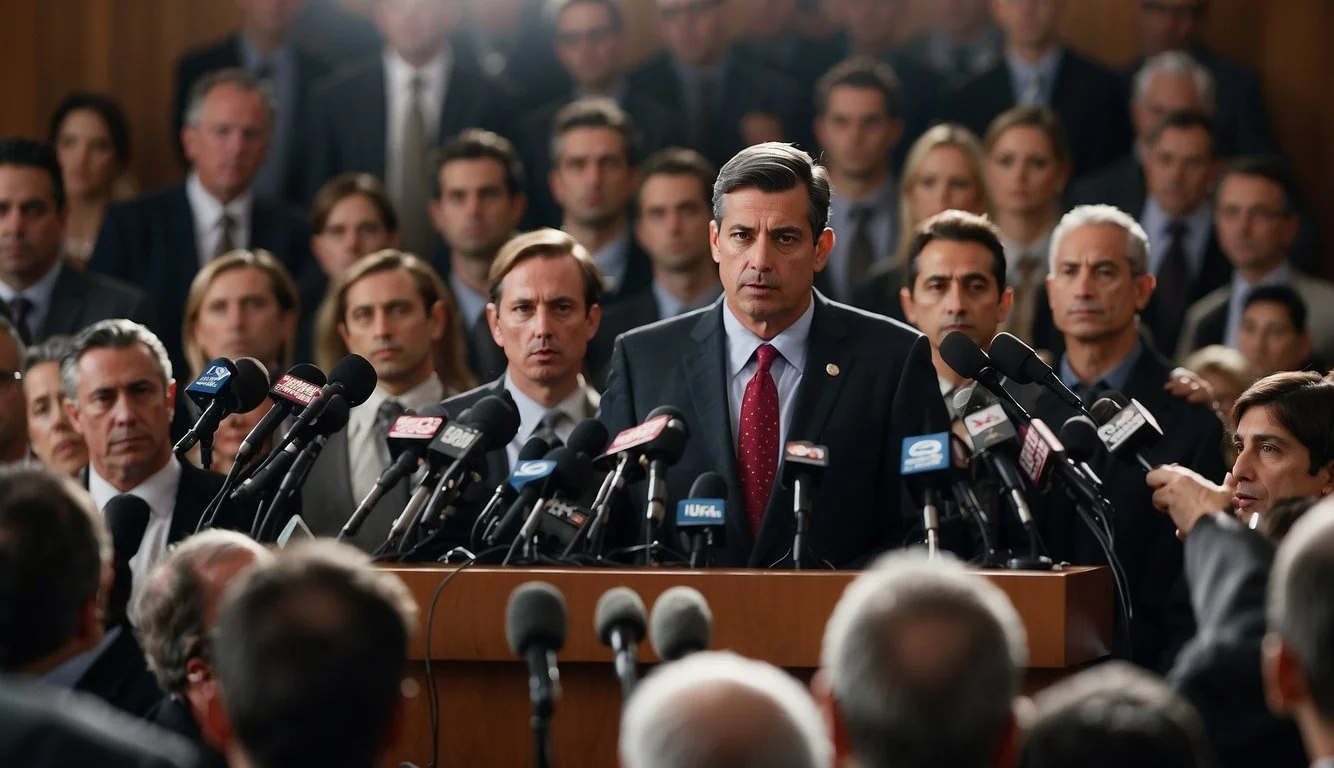Documentary Review: Weiner (2016)
A Politician's Rise and Fall
Anthony Weiner's political career was once promising, marked by his fierce advocacy and charismatic persona. The documentary "Weiner" (2016) captures the dramatic unraveling of this career, offering viewers a front-row seat to the scandal that would ultimately define him. Following his New York mayoral campaign, the film presents a raw, unfiltered look at the consequences of his infamous sexting scandal.
Through a blend of personal and political footage, "Weiner" delves into both his professional ambitions and personal struggles. The documentary highlights the intense media scrutiny and personal turmoil faced by Weiner and his wife, Huma Abedin, providing a sobering behind-the-scenes look at political implosion. This intimate portrayal invites viewers to contemplate the frailty of public personas and the complex interplay between personal indiscretions and professional downfall.
Directed by Josh Kriegman and Elyse Steinberg, "Weiner" offers more than just a recount of scandal; it serves as a compelling exploration of how public figures navigate crises. This film stands out as a must-watch for those intrigued by the complexities of political life and the relentless nature of modern media.
Overview of 'Weiner'
Weiner is a 2016 documentary directed by Josh Kriegman and Elyse Steinberg. It chronicles the tumultuous journey of Anthony Weiner, a former seven-time Congressman, and his attempt to revive his political career by running for New York City mayor.
The film provides an observational lens, capturing both public and private moments, giving viewers unprecedented access to the highs and lows of Weiner's campaign.
Anthony Weiner's scandal, primarily revolving around his sexting incidents, deeply impacted his political aspirations. The documentary doesn't shy away from depicting the discomfort and chaos brought about by these revelations.
Huma Abedin, Weiner's wife and a long-time aide to Hillary Clinton, features prominently. Her reactions and struggles offer a poignant counterpoint to the unfolding scandal.
Filmed during the 2013 mayoral campaign, the documentary premiered at the 2016 Sundance Film Festival. Critics have noted its raw and cringe-inducing moments, showcasing the blend of personal and political crises.
The film's approach combines elements of comedy and tragedy, making it compelling yet uncomfortable to watch. This complex portrayal helps to elucidate the nuances of a scandal-plagued political career.
Overall, Weiner stands out for its candid and close-up examination of a political downfall, engaging audiences through its unfiltered and direct storytelling.
Contextual Background
Weiner (2016) dives into the life and career of Anthony Weiner, a former U.S. Congressman, against the backdrop of the 2016 political environment. The documentary provides a detailed exploration of his political journey and the tumultuous period culminating in his scandal.
Anthony Weiner's Career
Anthony Weiner served as a Congressman for seven terms, representing New York's 9th district. Known for his fiery speeches and passionate advocacy, he often championed causes like healthcare and housing reform. His tenure in Congress was marked by significant legislative efforts and vocal opposition to policies he disagreed with, gaining him a reputation as a bold and outspoken politician.
In 2011, Weiner's career took a dramatic turn due to a sexting scandal that led to his resignation. Attempting a political comeback, he ran for mayor of New York City in 2013. Despite initial support, his campaign was derailed by revelations of additional scandalous behavior. The documentary captures this pivotal moment, highlighting the personal and professional challenges he faced.
The Political Landscape in 2016
The political landscape in the United States in 2016 was highly charged, characterized by intense debates, shifting party dynamics, and a contentious presidential election. The rise of Donald Trump and the polarizing nature of his campaign redefined the political discourse. Concurrently, Hillary Clinton's candidacy and Bernie Sanders' insurgent campaign indicated a deeply divided electorate.
This period was also marked by increasing scrutiny of politicians' personal lives, with a growing prevalence of social media enabling rapid dissemination of information. The public's demand for transparency and accountability led to greater challenges for political figures, including Weiner, whose past scandals were revisited in this climate. The documentary situates his personal trials within these broader political movements, offering viewers a comprehensive view of the era.
Documentary Synopsis
"Weiner" (2016) is a political documentary that provides a fly-on-the-wall view of Anthony Weiner’s tumultuous mayoral campaign in New York City. The film also portrays the personal and professional struggles of Weiner and his wife, Huma Abedin.
Plot Summary
Anthony Weiner's mayoral campaign in 2013 is the central thread of the documentary. The film opens with an overview of Weiner's political career, capturing his passionate speeches and commitment to public service. As the campaign progresses, the narrative shifts to his sexting scandal, which had initially caused his resignation from Congress. The documentary highlights the public’s reaction and the media frenzy that ensues. It also provides behind-the-scenes footage detailing the strain on Weiner's personal life and campaign staff. The film ends with the collapse of his campaign, presenting a complex portrait of a flawed yet determined individual.
Main Characters
Anthony Weiner: The protagonist, a former congressman and mayoral candidate, whose career and campaign are marred by a sexting scandal.
Huma Abedin: Weiner's wife, a prominent political figure, and long-time aide to Hillary Clinton. She stands by Weiner throughout the fallout, showcasing her personal turmoil.
Jordan Zain Weiner: The couple's young son, symbolizing the personal stakes for the family.
Campaign Staff: Though secondary, the campaign staff members are crucial, offering insights into the pressures and challenges faced during the tumultuous campaign period.
Key Events
Several key events shape the narrative of "Weiner." The initial setup provides context, showing Weiner's past achievements and ambitions. The re-emergence of the sexting scandal serves as the primary catalyst, shifting the film’s focus from a promising campaign to damage control. The unraveling of Weiner's campaign includes intense media scrutiny, diminishing public support, and internal conflicts within the campaign team. Each of these events builds tension, leading to the dramatic conclusion where Weiner's run for mayor comes to an end. The documentary captures these moments with raw authenticity, presenting a gripping story of political ambition and personal downfall.
Film Production
"Weiner" is a documentary that draws viewers into the dramatic fall of Anthony Weiner, blending moments of personal vulnerability with political chaos. Detailed craftsmanship in directing, cinematography, editing, and sound design all contribute to the compelling nature of this film.
Directors and Producers
The documentary is directed by Josh Kriegman and Elyse Steinberg. Kriegman brings insider experience as a former chief of staff for Anthony Weiner. Steinberg's expertise in social and political issues complements this perspective. They managed to get extraordinary access to Weiner's personal and political life, allowing for a deeply immersive experience.
Producers involved included Edgeline Films in association with Motto Pictures. The production team diligently worked to capture moments of tension and intimacy that reveal much about the subject's life.
Cinematography
The cinematography in "Weiner" emphasizes the raw, unfiltered nature of the documentary. Using handheld cameras, the filmmakers provided a sense of immediacy and intimacy. This approach places viewers directly in the thick of political rallies, personal confrontations, and moments of solitude.
Camerawork shifts between polished campaign events and candid behind-the-scenes glimpses, helping to construct a multi-faceted view of Weiner's tumultuous journey.
Editing
Editing by Eli B. Despres was pivotal in shaping the narrative's tension and pacing. Despres skillfully juxtaposed public persona and private life, enhancing dramatic moments without becoming sensational.
The editing team expertly wove together various sources of footage, including media clips, interviews, and real-time sequences from Weiner’s campaign trail, to create a coherent and engaging storyline.
Music and Sound Design
The sound design, managed by a team of professionals, underlines the film's emotional beats. Music was carefully chosen to augment scenes, adding layers of meaning and tension without overshadowing the raw events on screen.
Subtle audio cues punctuate moments of intensity, while more subdued soundscapes create an atmosphere for personal reflections and quieter scenes. This careful balance ensures the audience remains engaged throughout the film.
Themes and Messages
In "Weiner," viewers explore the complex intersection of media dynamics, personal privacy, and the fallout from political scandals, providing a multifaceted narrative on contemporary public life.
The Role of Media
The film illustrates how media shapes public perception and the political landscape. Anthony Weiner's campaign, heavily documented by the press, reveals the relentless nature of media scrutiny.
News outlets pursued every angle of his story, often prioritizing sensationalism over substance.
This relentless coverage influenced public opinion and affected his campaign strategy. The documentary showcases moments where media presence dictated the actions and responses of Weiner and his team, highlighting the influence of media in modern politics.
Personal Privacy and Public Life
"Weiner" delves into the blurred lines between personal privacy and public life. The film questions how much of a public figure’s personal life should be exposed and scrutinized by the public.
Anthony Weiner's private indiscretions were broadcasted, affecting his personal and professional relationships deeply, demonstrating the intrusion into personal lives that often comes with public service.
Marriages and friendships are put under a microscope, showing the human cost of public exposure. This perspective challenges viewers to consider the ethics of privacy in an age of transparency.
Consequences of Scandal
The documentary powerfully portrays the consequences of scandal on both personal and political fronts.
Anthony Weiner's continuing saga of sexting scandals not only derailed his mayoral run but also left an indelible mark on his public persona.
The film explores how these scandals forced constant damage control, leading to a cyclical pattern of crisis and apology. It also examines the impact on Weiner’s family and supporters, shedding light on the broader ripple effects of personal mistakes in the public eye.
Critical Analysis
"Weiner" (2016), a documentary by Elyse Steinberg and Josh Kriegman, gives an unfiltered look into Anthony Weiner's ill-fated New York City mayoral campaign. The film is noted for its blend of humor and discomfort, providing a gripping, yet painful, viewing experience.
Reception by Critics
Critics have praised "Weiner" extensively for its raw and candid portrayal of political scandal. Roger Ebert's review highlights the film's ability to turn real-life events into an engaging cringe comedy. The documentary is recognized for its extraordinary access, allowing viewers a rare behind-the-scenes look at Weiner's attempt to redeem his political career. The Guardian describes it as a "documentary-maker's dream," emphasizing its compelling narrative.
Public Perception
Public reaction to "Weiner" has been mixed. While the documentary garnered interest due to its controversial subject, some viewers found it difficult to watch because of the personal and political turmoil it reveals. The humor and intensity of the film have made it popular among audiences interested in political documentaries. However, its portrayal of a marriage in disarray and a career's collapse has invoked a range of emotions, from empathy to disdain.
Awards and Nominations
"Weiner" premiered at the 2016 Sundance Film Festival, earning significant acclaim. The film was nominated for several awards, signaling its impact within the documentary community. Notably, it won the Grand Jury Prize for U.S. Documentary at Sundance, cementing its status as a powerful and influential piece. Additional nominations and wins further highlight its success and the effective storytelling by its directors.
Impact and Legacy
Weiner (2016) left a significant mark, both on the landscape of political documentaries and on Anthony Weiner's career trajectory. Its portrayal of personal and political scandal resonates deeply within these realms.
On Political Documentaries
Weiner pushed the boundaries of political documentary filmmaking. The film's unflinching access and candid moments offered viewers a behind-the-scenes look into the chaos of a political scandal. Many praised its raw, unfiltered narrative.
This documentary's style of immersion broke new ground, influencing subsequent political documentaries. Future filmmakers drew inspiration from its approach to capturing real-time events. The film demonstrated the power of documentary cinema to impact public perceptions and engage a wider audience.
On Anthony Weiner's Career
The documentary undeniably shaped Anthony Weiner's public image. His attempts to revive his political career were documented with painful honesty, detailing his struggles and personal issues.
Weiner's portrayal in the film led to widespread public scrutiny, further diminishing his chances in politics. The documentary serves as a crucial piece of media that documented his career's decline and offered a cautionary tale about the interplay of private actions and public consequences.
Comparative Discussion
"Weiner" (2016) offers a raw glimpse into Anthony Weiner's turbulent political career amidst scandal. This documentary can be compared to other political documentaries and fictional political dramas to better appreciate its unique approach.
Similar Documentaries
This film has parallels with other political documentaries like "The War Room" (1993) and "Mitt" (2014), which provide behind-the-scenes perspectives of political campaigns.
"The War Room" focuses on Bill Clinton’s 1992 presidential campaign, highlighting strategic moves and media interactions. In contrast, "Weiner" delves into the aftermath of scandal and the attempt at redemption.
"Mitt" covers Mitt Romney’s 2012 presidential race, portraying the human side of a political figure under public scrutiny. Both documentaries feature the personal toll on the candidates and their families, similar to Weiner's portrayal of Huma Abedin.
Engagement is a shared factor, as these documentaries maintain a gripping narrative amidst the chaos of political life.
Contrast with Fictional Political Dramas
Unlike fictional dramas like "House of Cards" or "The West Wing," "Weiner" presents real-life events and authentic footage.
"House of Cards" showcases a dark, manipulative world where characters often employ ruthless strategies for political gain. "Weiner" contrasts sharply, focusing instead on genuine personal and campaign struggles.
"The West Wing" tends to idealize political operations, with articulate, morally driven characters shaping policy. Weiner’s documentary strips away such idealism, revealing the messiness and vulnerability inherent in real political careers.
By presenting unfiltered reality, "Weiner" provides a stark comparison to the often-heroic representations found in fictional political dramas.
Conclusive Thoughts
The documentary Weiner offers a revealing glimpse into the volatile world of political scandals and personal downfall. The filmmakers, Josh Kriegman and Elyse Steinberg, capture Anthony Weiner's mayoral campaign with unprecedented access, exposing the intricacies of his personal and political challenges.
The film's strength lies in its ability to blend humor with uncomfortable truths. Through a mix of observational footage and candid moments, the audience witnesses the collapse of a once-promising career. This combination makes the documentary both engaging and thought-provoking.
Weiner also explores the impact of the scandal on those around him, particularly his wife, Huma Abedin. Her presence in the film adds a layer of complexity, showcasing the personal costs of public life. The documentary does not shy away from the emotional turmoil experienced by the couple.
The film maintains a neutral stance, allowing viewers to form their own opinions. Its observational style prevents it from becoming preachy or judgmental. This approach ensures a balanced portrayal, free from overt bias.
Ultimately, Weiner serves as a compelling case study of modern political theater and the influence of media on public perception. Its insightful exploration of scandal makes it a noteworthy addition to political documentaries. Through its candid and unfiltered approach, Weiner provides an honest look at the consequences of personal actions in the public eye.





